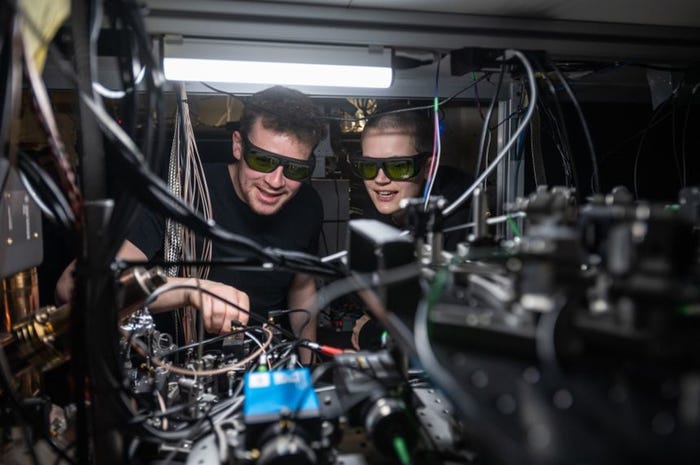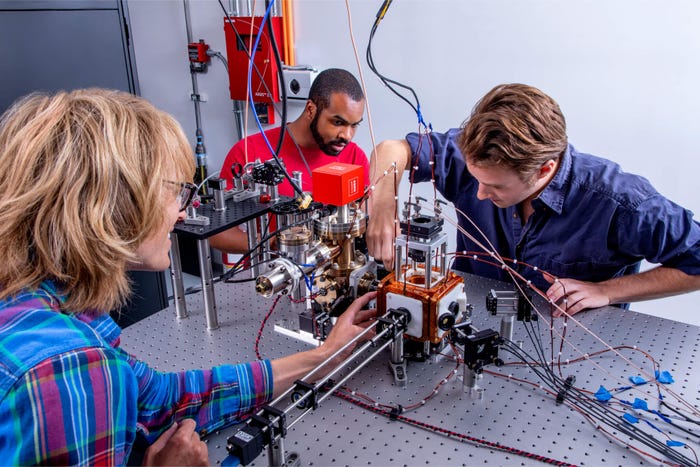
Connects decision-makers and solutions creators to what's next in quantum computing
How HSBC, Quantinuum Tap Quantum for Banking’s Biggest ProblemsHow HSBC, Quantinuum Tap Quantum for Banking’s Biggest Problems
Q&A with Quantinuum’s Ilyas Khan

Quantum computing company Quantinuum announced last month that it is working with Europe’s largest bank, HSBC, on projects to explore banking use cases for quantum computing, including cybersecurity, fraud detection and natural language processing.
In this Q&A, Quantinuum founder and vice-chair Ilyas Khan discusses how the partnership is addressing near-and longer-term banking problems.
Enter Quantum: What’s the background to your partnership with HSBC?
Ilyas Khan: We have been in contact with HSBC for some time because HSBC is one of the few firms that have a meaningful presence of qualified full-time, internal staff devoted to quantum. The London location helped too.
Figuring out the projects took seven or eight months. Mechanically what happened was that we came up with some ideas, which we thought would have immediate impact, within a 12-month window. Some things that we thought would have a foundational impact and some things which are going to be game changers, but longer term – when we started we thought that would be three to five years.
It quickly became obvious that we would end up doing more than one project. Having gone through that process with [head of quantum] Philip Intallura, HSBC came up with use cases that might fit the technology we described.
One of the near-term projects is quantum cybersecurity. How are you addressing that?
We’re deploying our [quantum-enhanced cryptographic key generation platform] Quantum Origin. I think it’s the only product of its kind that uses quantum that exists today that a) solves the real problem, and b) isn't subject to further advances in quantum right.
Most of cybersecurity is made up of locks and keys and you need a good lock and you need a good key. Quantum Origin is the key side. It’s a quantum-hardened key, which means that it’s built and seeded from a quantum computer, in this case, it's our H-Series quantum computer.
Then there's a bit of magic that goes on after the quantum computer has been involved before the key can be generated, and different organizations have different internal procedures. Depending on those procedures, we can then implement without a change in infrastructure; you don't need to spend gazillions of dollars and you don't need to buy a quantum computer.
In the case of HSBC, they have looked at this from the standpoint of critical communications and you can think of the project as a genuine proof of concept with an actual application for actual security in an actual communication setup.
You’re also looking at use cases for quantum machine learning (QML)
There are two projects. Fraud detection is paramount for banks and HSBC are not the only people to be thinking about this and this is a really interesting project. From the standpoint of a bank, you have to if you're regulated, you can't do black box solutions.
In fraud detection, when you're looking at discrete datasets, you're talking about material that the bank already possesses, so it is not generative like large language models. So the fraud detection project is going to use a supervised learning model.
Using quantum technologies, we believe that we can prove advantage in the context of this regulated environment within an industrial-scale application. The reason HSBC are so interested in this is that it's an area of expertise for them anyway. They know all there is to know about this, but we've got that technology.
You’re also working with quantum natural language processing (QNLP)
The poster child for what an AI system can do is language. People talk about a machine being human-like but for most of the history of technology, machines have been not human-like. They do things that humans can’t. So if you go back 200 or 300 years, the Spinning Jenny did something that humans could do, but better and faster, and then came steam engines and airplanes. With existing computers, they can do adding, multiplying, dividing, all these mathematical functions better.
But when you talk about AI people start to talk about human-like intelligence. Any description you have of ChatGPT or similar comes down to this slightly misleading term artificial general intelligence (AGI) comes in. A few years ago, when we used to be Cambridge Quantum, we decided that we wanted to be the leaders in AI from a content standpoint.
I've been often quoted as being quoted by saying that the only route forward, the only way that we're going to get this thing working for the benefit of humanity properly at scale, is if it's interpretable. This quantum approach that we have is based on this knowledge base on two assumptions: firstly that language processing can be quantum native and secondly, that it can be interpretable.
Four years ago, no one was interested, but today, this is now humanity's preoccupation. I'm afraid I'm unable to give you any more details about the QNLP project with HSBC, but it is deeply relevant to interpretability and using the freedom of Hilbert space in a quantum computer.
About the Author
You May Also Like






